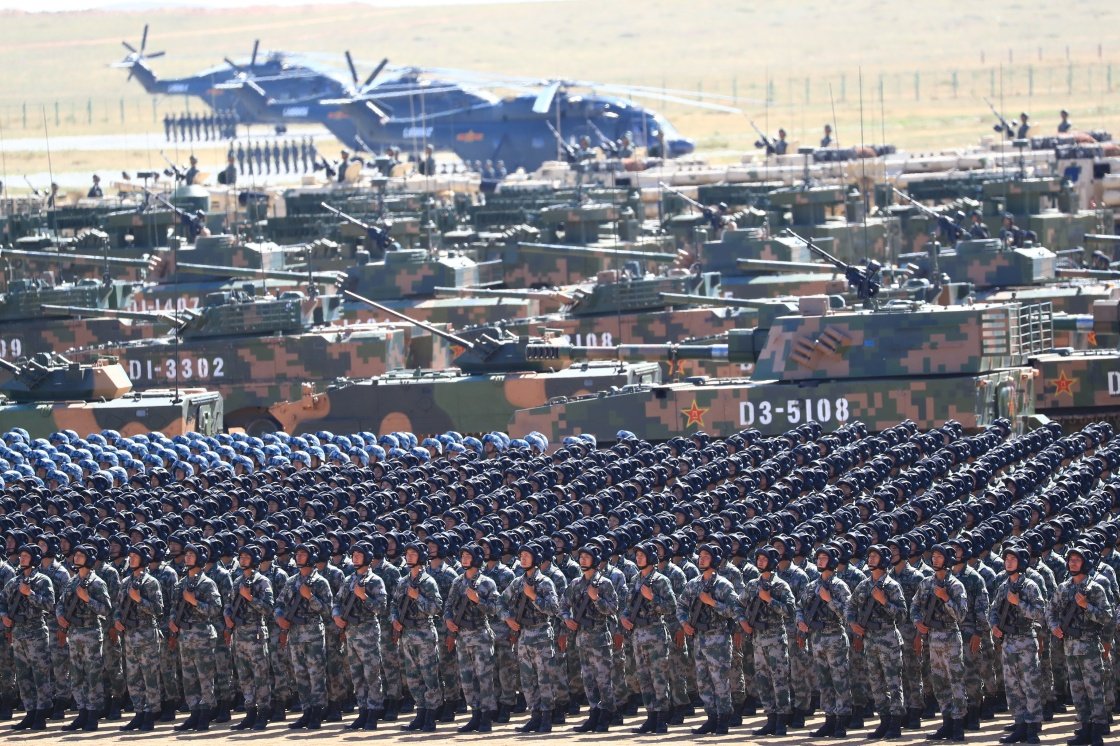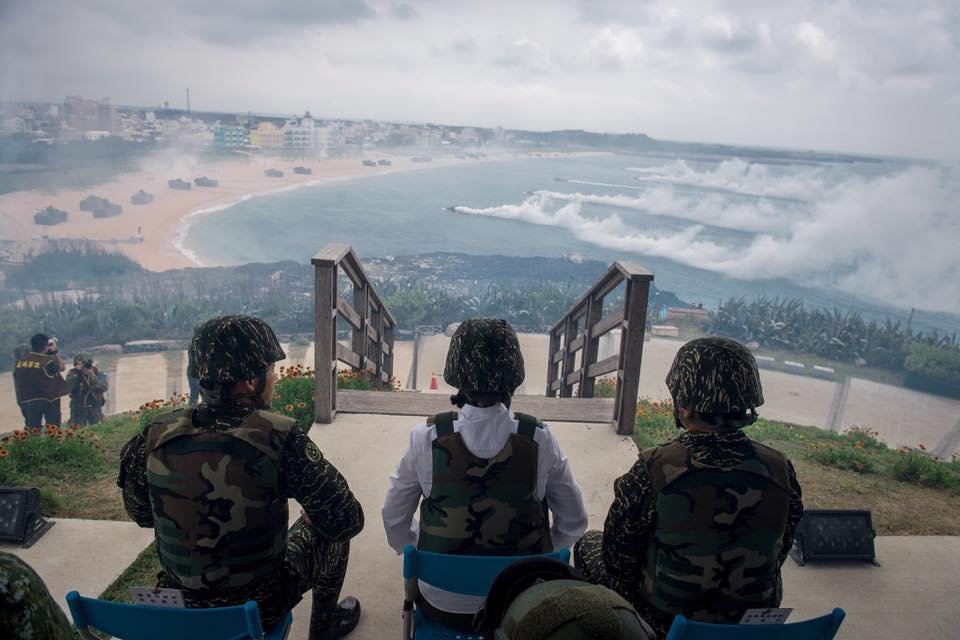The issuance of a unification deadline to Taiwan would be a high-stakes gamble for Beijing, as the effects of such a move could precipitate the two societies in unpredictable directions.
In October, former AIT chairman Richard Bush speculated that Chinese President Xi Jinping’s address at the 19th Chinese Communist Party (CCP) Congress later that month could involve the issuing of a deadline for Taiwan to formally unify with China. Such a demand would presumably be accompanied by the threat of military action against Taiwan if the terms were not met.
Although President Xi did not, in fact, end up issuing any such deadline at the Party Congress, and China to date has never set a firm deadline for unification, this has always been a possibility worth looking into. Indeed, China’s Anti-Secession Law explicitly states that the People’s Republic of China will resort to forceful measures to achieve unification with Taiwan should it not be achievable through “peaceful” means, and the issuance of a fixed deadline for Taiwan to unify on China’s terms once and for all would be the logical last of such “peaceful” options.
Coercive demands implying the use of force are nothing new in international relations; modern history is replete with examples of ultimatums bound to military threats. But it is typically authoritarian regimes, not Western democracies, that have been on the receiving end of such demands in the modern era — the U.S.’ 1994 demand that Haitian strongman General Joseph Raoul Cédras step down from power during Operation Uphold Democracy, the U.N. Security Council’s January 1991 demand that Saddam Hussein’s Iraq withdraw from Kuwait, NATO’s demands to Slobodan Milosevic before and during Operation Allied Force, and the George W. Bush administration’s March 2003 demand that Saddam himself leave Iraq, to name a few.
Deadlines of this sort have often been disregarded by the authoritarian regimes they were issued to, and followed up with military force by the nations that issued them. How a Westernized democracy like Taiwan would react to such an ultimatum is harder to predict, however, and there is little historical precedent to draw upon.
Despite having never issued a deadline of this sort to Taiwan in the 60-plus years of cross-Strait standoff, Beijing is more likely than not to give Taiwan such an ultimatum at some point. This stems largely from four factors: Firstly, Chinese desire for unification with Taiwan is not likely to abate in the years ahead and will in fact likely intensify. Secondly, Taiwanese self-identity and opposition to unification is likewise unlikely to abate if current trends continue; indeed, it is also likely to intensify. Thirdly, China, in its own words, cannot permit the “status quo” to carry on indefinitely. Finally, China likely desires that war be a last resort, and hence would be averse to launching a war if such war could be avoided. A unification deadline of this sort offers Beijing its last non-violent option for bringing Taiwan to heel. The combination of these elements makes it quite likely that Beijing will see the need, at some point down the road, to put a firm “date of resolution” to the Taiwan “issue.”
The view from Beijing
Internal Chinese politics will play a significant role in such a matter, and there are factors of national sentiment and individual prestige to be considered. The issuance of such a demand to Taiwan would likely galvanize the Chinese public and boost the popularity of whichever Chinese president had issued it. Xi Jinping (or a future Chinese president) might intentionally try to burnish his image, yet also avoid responsibility, by demanding that Taiwan unify at a deadline set somewhat far into the future — say, the year 2030, when Xi himself will have long since left office — thus gaining historical credit as the Chinese president who got the ball rolling on the Taiwan issue, yet also handing off the thorny task of the actual enforcement itself, and all entailed risks therein, to his successor(s).
A distant deadline is more beneficial to China than a near one, for several reasons. Setting an unexpectedly short deadline — say, unification within a few months — is likely to backfire, causing the Taiwanese public to dig in its heels in resistance. The Taiwanese political backlash against such a demand would likely surpass that which followed China’s March 2005 passage of its Anti-Secession Law by a far margin. But a deadline of one or two decades from now could allow a “resistance-is-futile” perception to gradually grow in the Taiwanese public’s consciousness. It would also give time for unification to be seriously debated in Taiwan and shift the Overton Window as support for cross-Strait unification rose from fringe view to mainstream position. And it would also give potential Taiwanese allies, such as the U.S. and Japan, abundant time to consider whether they really want to risk blood and treasure to intervene militarily on Taiwan’s behalf or not — an answer that, over time, may increasingly become “No.”

The People’s Liberation Army could one day be called upon to force unification on Taiwan. But for all its avowed might, this remains the least desirable option for Beijing (Photo courtesy of the PRC Ministry of National Defense).
Should such an ultimatum be issued, Beijing may draft its terms in language as generous-sounding as possible. Firstly, to sound as “reasonable” as possible to the international community. Secondly, to increase the chance Taiwan might indeed comply with the deadline — which is, after all, the goal of such an ultimatum. Thirdly, to portray a Taiwanese refusal to accede to such conditions as “unreasonable.” Finally, China would be in a position of near-total power after unification and could always renege on its promises after the fact, as it has done with Hong Kong, and hence risks little by promising very generous-sounding terms from the outset.
The issuance of such a deadline-ultimatum to Taiwan also entails significant drawbacks for Beijing. For one, it would do away with the element of military surprise. An attack on Taiwan is likelier to succeed if it catches Taiwan unprepared, but the announcement of a deadline makes the timing of such Chinese military attack abundantly clear, likely leading to Taiwanese actions such as a mobilization of reservists, stockpiling of war materiel, and so forth. It is still possible, though, that China could achieve surprise nonetheless by attacking sooner than the announced deadline, were it to decide that such were the most desirable course of action.
The view from Taipei
With a distant deadline, Taiwan would also have adequate time to ramp up its military spending and improve its defenses in a comprehensive way that a shorter timeframe would not permit. Indeed, it is possible that Taiwan could ramp up its defenses to the point that a Chinese invasion would be completely untenable by the time the unification deadline arrived. Such a Chinese threat might cause the U.S. to increase arms sales to Taiwan (although there may also be contrary voices within U.S. circles arguing that if Taiwan’s unification with China is inevitable, the U.S. should then not release advanced weaponry to Taiwan that would eventually be absorbed into China’s inventory). In the most extreme case, a Chinese deadline could even give impetus for Taiwan to revive its long-dormant nuclear weapons program or resort to other drastic defense measures.

A fixed deadline for unification supported by the threat of military force could compel Taiwan to bolster its national defense and preparedness (Photo and cover photo courtesy of the Tsai Ing-wen official Facebook page).
The economic effect of such a declaration would probably be a flight of financial capital and people out of Taiwan, similar to that which preceded Hong Kong’s 1997 handover to China. Such an exodus of capital and people from Taiwan would not be in China’s interest — Beijing would want to absorb Taiwan as economically intact as possible — but by the time Beijing issued such an ultimatum, such considerations would probably be something China would be prepared to write off as an acceptable loss. And if more and more Taiwanese people abandoned ship, this perception of a “lost cause” could take deeper and deeper root in Taiwan, which would also work to China’s advantage.
Should such an ultimatum be given, Beijing would find it very difficult to walk it back even if it were advisable to do so, as the loss of credibility in doing so would be damaging to the Chinese Communist Party. To avoid being trapped, China might make the terms of the demand crystal clear — that Taiwan must unify with China at a set, fixed deadline — but to leave the nature of enforcement of the ultimatum open-ended and vaguely worded. That is to say, China would not obligate itself to immediately respond with military force should Taiwan flout the deadline, but use loose language permitting itself to resort first to lower-level means of coercion such as diplomatic sanctions, embargoes and trade measures.
The democracy variable
As mentioned above, it is typically authoritarian regimes, not Westernized democracies, that have been on the receiving end of modern ultimatums bound to military threats. There is therefore little historical precedent relevant to Taiwan that can be drawn upon in this instance. Nevertheless, a regime issuing deadline demands to a democracy is still unlikely to get the desired result. The nature of a democracy simultaneously allows for anonymous defiance at the voting booth and dissuades elected leaders from compliance with such an unpopular demand. A Taiwanese presidential administration — whether DPP or KMT — could simply read domestic Taiwanese opinion polling and respond accordingly; acceding to or rejecting China’s demands as the polling indicated.
A regime issuing deadline demands to a democracy is still unlikely to get the desired result. The nature of a democracy simultaneously allows for anonymous defiance at the voting booth and dissuades elected leaders from compliance with such an unpopular demand.
Alternatively, the Taiwanese government could respond to a Beijing-issued deadline by announcing that the response to such demands would have to be provided via a nation-wide referendum, thereby washing decision responsibility off its hands. If a majority of Taiwanese voters cast ballots against compliance with Beijing’s demands, the Taiwanese government could then simply say, “Our electorate has voted against unification, and as a democratic government it is our job to reflect the will of the people.” (If Taiwanese voters voted for unification, on the other hand, then the Taiwanese administration would likewise be relieved of the decision burden and not be “culpable” for having handed Taiwan back to China.)
The issuance of a unification deadline to Taiwan would be a high-stakes gamble for Beijing. The potential reward would be accelerated cross-Strait unification, a galvanized Chinese public at home and a surge in popularity for the Chinese leader who set the ball rolling. The potential danger would be a Taiwan all the more armed, defiant, and distant from unification than ever before. But as nationalist sentiment grows within Taiwan and China alike, it is a gamble that Beijing may eventually decide it has no choice but to take.
You might also like
More from Cross-Strait
Beijing Was Cooking the Frog in Hong Kong Well Before the National Security Law
Well before the coming into force of the NSL on July 1, the special administrative region had already become a …
President Tsai’s Second Term and Cross-Strait Relations: What to Watch Out For
The next four years will be marked by uncertainty over China’s trajectory and the state of the world in the …
As Coronavirus Crisis Intensifies, Beijing Continues to Play Politics Over Taiwan
With a major epidemic on its hands, the Chinese government has not ceased its political warfare activities against Taiwan. It …









